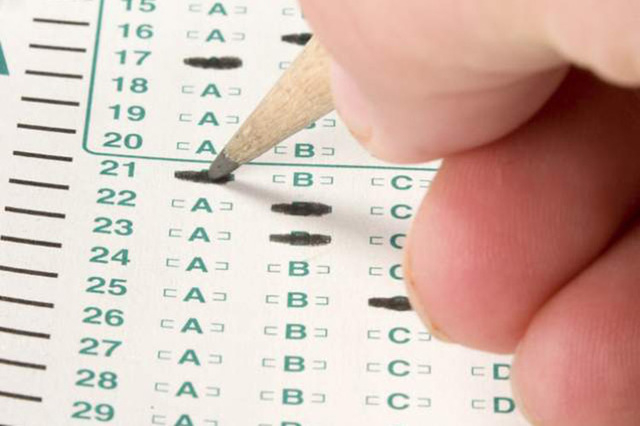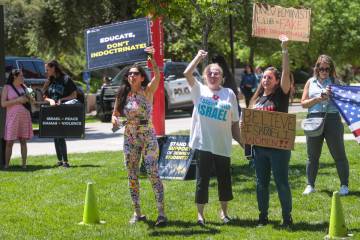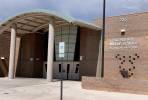CCSD investigation finds no proof of cheating
Kelly Elementary School wasn’t cleared of state accusations that cheating occurred on standardized tests in 2012, but it heard the next best thing on Thursday.
In its own investigation, the Clark County School District interviewed the same people and reviewed the same documents as state investigators had. However, the district found no evidence of staff members or anyone else changing student answers, and can’t assert that cheating occurred, Superintendent Pat Skorkowsky said Thursday after the district released a 41-page report with 61 pages of backup material.
“We did a thorough and exhaustive investigation, as you’ll see in this report,” Skorkowsky said. “Do we know for a fact that anybody did anything wrong? We couldn’t come to any conclusive evidence.”
While cheating couldn’t be ruled out as a potential reason for a remarkable spike in test scores at the school near Lake Mead and Martin Luther King boulevards, it definitely wasn’t proved, he said.
That is a far different conclusion than presented in April by State Superintendent of Public Schools Dale Erquiaga when he released investigation results from the Nevada Department of Education and the attorney general’s office.
“I have no doubt that… student answer sheets were altered by one or more adults in the system,” Erquiaga said at the time.
Erquiaga’s conclusion was based largely on the state’s analysis of student scorecards that found an unusually high number of erasures showing answers changed from wrong to right. However, Erquiaga said no culprits could be identified. He also didn’t provide any direct evidence that adults made the erasures.
For that, he has been criticized by Stephen Augspurger, executive director of the Clark County school administrators union, and a group of Las Vegas ministers, who contend that no evidence supports the conclusion that adults changed student answers. All the analysis shows is an unusual number of erasures occurred.
The district’s report concurs with the state’s finding that student scorecards showed an unusually high number of wrong-to-right erasures, but didn’t make the same leap as Erquiaga that adults were responsible for those erasures.
Erquiaga declined an interview with the Review-Journal on Thursday.
“We don’t know how those erasures happened,” said Skorkowsky, noting that it could have been students during testing or adults afterward.
However, Skorkowsky said, there is no evidence showing that cheating didn’t occur in 2012, when there were “pervasive” holes in Kelly’s test security, which is why he is not calling for Kelly’s 2012 test scores to be reinstated.
“I don’t have enough conclusive evidence to say the test scores should be reinstated,” Skorkowsky said.
Some findings are undisputed. Security procedures weren’t sufficient for Kelly’s tests. For that, Skorkowsky is recommending that Kelly’s then-Principal Patricia Harris and Assistant Principal Steve Niemeier be disciplined, according to the district’s report. He doesn’t believe their licenses should be suspended or revoked but will leave that to the Clark County School Board to decide.
The district’s report describes a two-part corrective plan. The district’s testing procedures will be changed and school administrators trained on these changes. In addition, Kelly will receive a corrective action plan to improve the school. A district committee has been formed to create an instructional program specific to the school, and a principal will be hired to carry it out, Skorkowsky said.
Nevada Department of Education spokeswoman Judy Osgood said the state is “pleased” that the district agrees testing security measures were not followed, and it awaits the School Board’s action on Nov. 13 for measures outlined in the district report.
Still, many questions remain.
“What we do know is there was an extreme spike in test scores one year and an extreme dip the next year,” Skorkowsky said.
In 2010-11, not even a quarter of Kelly’s fifth-graders read at grade level. However, that number more than tripled, to 77 percent, the following year, according to Kelly’s invalidated test results. From 2011 to 2012, the proficiency rate for third-graders in math went from 45 percent to 69 percent. In reading, third-grader proficiency went from 45 percent to 88 percent.
The state concluded those changes were too dramatic. But statistically, it doesn’t take many students to create such leaps when grade levels have about 40 students each, as they do at Kelly.
For example, 85 percent of fourth-graders scored as proficient in reading in 2011-12, doubling the passing rate of 42 percent from the previous year. With fourth-grade classes of 43 students in 2010-11 and 34 students in 2011-12, only 11 more students would have had to pass the test to account for such a leap.
For that grade to jump from a 51 percent to 74 percent proficiency rate in math, only three more students needed to earn passing scores.
Following concerns of tampering in the 2011-12 school year, district personnel administered the state skills tests in 2012-13. State investigators asserted in their report that “significantly” declining math and reading test scores in 2012-13 provide more evidence of adult cheating. Nevada schools must annually test third- through fifth-graders in math and reading.
The state report didn’t consider the impact of withdrawing Kelly’s $200,000 in extra resources in 2012-13, nor did it address the fact that test scores didn’t plummet back to previous levels. More third- and fifth-graders had passing math scores in 2012-13, when district personnel gave the tests.
Although the percentage of passing reading scores declined in 2012-13 at all three grade levels, passing rates were closer to the spike of 2011-12 than any previous year, with the exception of fourth grade.
For example, the rate of fifth-graders reading at grade level in 2012-13 was 72 percent, slightly down from 77 percent in 2011-12 but nowhere near the 24 percent rate in 2010-11, the year before the cheating investigation.
Critics of the state investigation assert these scores point to a weakness in its cheating accusations, but it’s not damning evidence one way or another.
“It appears our community will not have the clear resolution to this investigation that we would prefer,” Skorkowsky said.




























